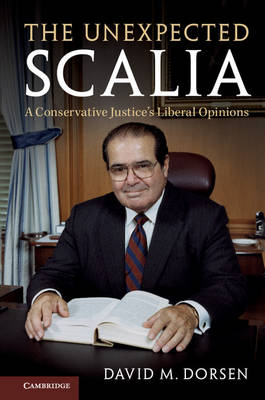
The Unexpected Scalia
Cambridge University Press (Verlag)
978-1-107-18410-7 (ISBN)
Antonin Scalia was one of the most important, outspoken, and controversial Justices in the past century. His endorsements of originalism, which requires deciding cases as they would have been decided in 1789, and textualism, which limits judges in what they could consider in interpreting text, caused major changes in the way the Supreme Court decides cases. He was a leader in opposing abortion, the right to die, affirmative action, and mandated equality for gays and lesbians, and was for virtually untrammelled gun rights, political expenditures, and the imposition of the death penalty. However, he usually followed where his doctrine would take him, leading him to write many liberal opinions. A close friend of Scalia, David Dorsen explains the flawed judicial philosophy of one of the most important Supreme Court Justices of the past century.
David Dorsen is Of Counsel with Sedgwick, LLP. He served as an Assistant US Attorney in New York under Robert M. Morgenthau, and later as Assistant Chief Counsel of the Senate Watergate Committee under Senator Sam Ervin. He has taught at Duke University, North Carolina, Georgetown University Law Center, Washington DC, and George Washington University Law School, Washington DC. His book, Henry Friendly, Greatest Judge of his Era (with Richard A. Posner, 2012), won the Green Bag Award for Exemplary Legal Writing.
Introduction - what is liberal?; Part I. Scalia's Judicial Philosophy: 1. The Confirmation hearings; 2. Scalia's principles of decision making; Part II. Scalia's Conservative Constitutional Opinions: 3. First and Second Amendments; 4. Constitutional criminal procedure; 5. Privacy and individual rights; 6. Government power and regulation; Part III. Scalia's Liberal Constitutional Opinions: 7. First Amendment - freedom of speech and more; 8. Fourth Amendment - search and seizure; 9. Fifth Amendment - criminal applications; 10. Sixth Amendment - right to trial by jury; 11. Sixth Amendment - confrontation clause; 12. Sixth Amendment - right to counsel; 13. Seventh Amendment - right to jury trial; 14. Habeas Corpus; 15. Separation of powers and Federalism; 16. Commerce clause and other provisions; Part IV. Scalia's Conflicted Constitutional Opinions: 17. Political speech; 18. Antiabortion demonstrations; 19. Free exercise of religion; 20. Punitive damages; 21. Peremptory challenges; Part V. Originalism Reconsidered: 22. Fundamentals reconsidered - textualism and originalism; 23. Fundamentals reconsidered - other doctrines; 24. Conservative opinions reconsidered - individual rights; 25. Conservative opinions reconsidered - other; 26. Liberal opinions reconsidered; 27. Conflicted opinions reconsidered; Part VI. Scalia's Nonconstitutional Opinions: 28. Four Liberal special cases; 29. Liberal criminal statutory opinions; 30. Liberal civil statutory opinions; 31. Conservative statutory opinions; Part VII. Finale: 32. The other originalist justice; 33. Conclusion.
| Erscheinungsdatum | 07.05.2017 |
|---|---|
| Zusatzinfo | Worked examples or Exercises |
| Verlagsort | Cambridge |
| Sprache | englisch |
| Maße | 160 x 236 mm |
| Gewicht | 690 g |
| Themenwelt | Recht / Steuern ► Allgemeines / Lexika |
| Recht / Steuern ► EU / Internationales Recht | |
| Recht / Steuern ► Privatrecht / Bürgerliches Recht ► Berufs-/Gebührenrecht | |
| ISBN-10 | 1-107-18410-X / 110718410X |
| ISBN-13 | 978-1-107-18410-7 / 9781107184107 |
| Zustand | Neuware |
| Haben Sie eine Frage zum Produkt? |
aus dem Bereich


